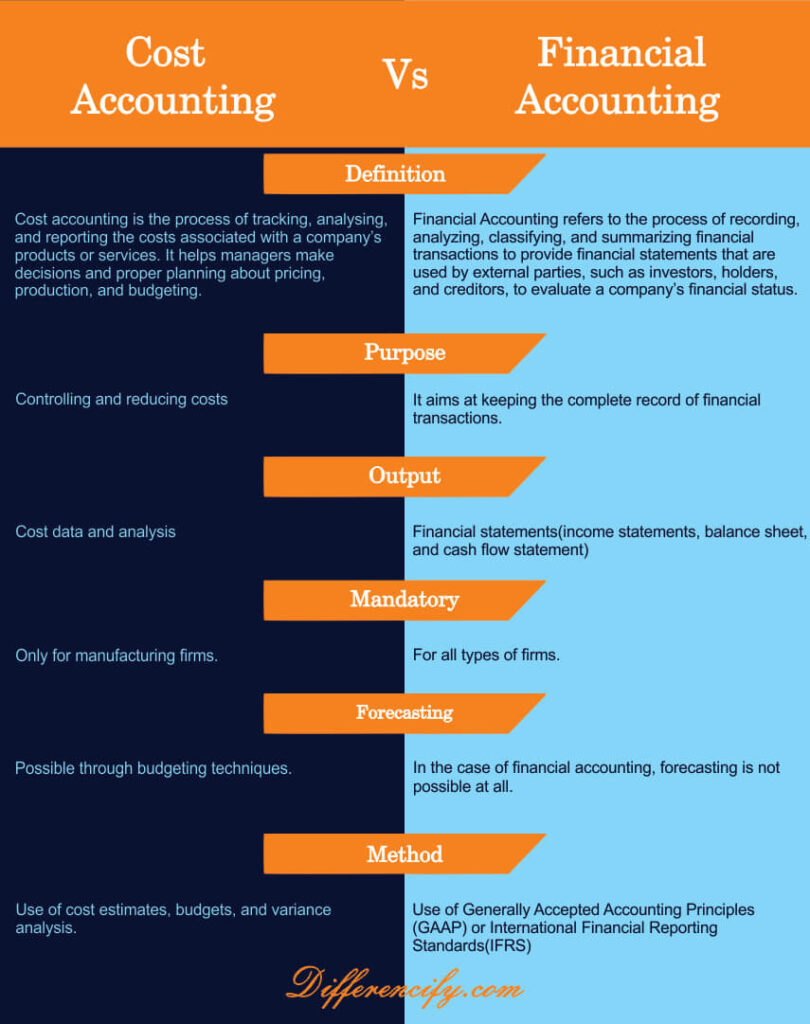Cost Accounting and Financial Accounting are the two major branches of accounting. These two domains play an important role in analyzing and reporting the cost and financial data of a firm. These two terminologies have completely different explanations from one another and that’s what we will go through in this article. This blog contains the following main topics.
You Can Also Read: Difference Between Manual and Computerized Accounting
Definition Of Cost Accounting
In economics and finance, cost accounting refers to the process of collecting, recording, classification, ascertaining, and analyzing information and data related to the cost of production and operation. It is an accounting used to calculate the cost of the products and helps in providing the data and information to the management for proper planning, operations, controlling and reducing costs, and making good decisions.
Arranging, presenting, recording, and recognizing suitable investment allocation for investment to determine the costs of goods and services is the primary function of Cost Accounting. Cost accounting focuses on considering all input costs related to the production including both fixed and variable costs. Cost accounting is a bit similar to financial accounting, but it is not communicated or reported at the end of the financial year.
There are two types of Cost Accounting and they are the following.
- Integrated Accounting System- The accounting system in which only one set of account books is maintained to record both the cost and financial transactions.
- Non – Integrated Accounting System- The accounting system in which two separate sets of account books are maintained-one to record cost data and the other to record financial data.
The objective of Cost Accounting
The four main objectives of cost accounting are:
- Cost Determination: This involves determining the cost of a product or service, which is essential for pricing, budgeting, and decision-making.
- Cost Control: This involves monitoring and controlling costs to ensure that they stay within budget and to identify areas where costs can be reduced.
- Cost Reduction: This involves identifying and implementing ways to reduce costs, such as through process improvements or by finding more cost-effective suppliers.
- Profit measurement: This involves determining the profitability of products, services, and projects, which is essential for making strategic business decisions.
Advantages of Cost Accounting
Three advantages of cost accounting are:
- Decision Making: Cost accounting provides management with the information they need to make informed decisions about pricing, production, and other operational matters.
- Control and evaluation of Performance: Cost accounting provides managers with the tools to measure the performance of their operations and to identify areas where improvements can be made.
- Budgeting and Forecasting: Cost accounting helps management prepare budgets and forecasts, which are essential for planning and controlling the company’s financial resources.
Definition Of Financial Accounting
Financial accounting is the branch of accounting that is concerned with recording, summarizing, analyzing, and reporting financial transactions related to the business. All the financial data is summarized in the composition of the financial statement including the balance sheet, income statement, and cash flow statement.
The data provided by financial accounting is helpful in making comparisons between different business entities and analyzing the results thereof, on various parameters. Also, it helps in comparing the performance and profitability of various financial spells.
Four Advantages of Financial Accounting
Four advantages of financial accounting are:
- Compliance: Financial accounting is used to comply with legal and regulatory requirements, such as the preparation of financial statements that are required to be filed with government agencies.
- Transparency: Financial accounting provides a clear and accurate picture of a company’s financial performance and position, which helps stakeholders, such as investors and creditors, to understand the financial health of the company.
- Planning and Decision-Making: Financial accounting provides management with the information they need to make strategic decisions about the direction of the company and to plan for the future.
- Performance Evaluation: Financial accounting provides a means to evaluate the performance of a company over time by comparing financial data across different periods, which helps management to identify trends and areas for improvement.
Cost Accounting Vs Financial Accounting(Comparison Table)
The following table exactly shows the distinction between cost accounting and financial accounting.

Key Differences Between Cost Accounting And Financial Accounting
Since we are comparing cost accounting vs financial accounting, here we have included the complete differences between cost accounting and financial accounting.
- Cost Accounting provides data and information to the managers for planning, operations, cost reduction processes, and making good decisions. On the other hand, Financial Accounting tells about profit and loss, and the financial position of the business to the owners and outsiders.
- Cost Accounting tracks both historical and pre-determined costs. On contrary, Financial Accounting aims to record historical costs only.
- While cost accounting is used by management to improve business process efficiency and financial accounting help to present the business performance.
- Cost accounting focuses on the internal management of an organization. On the other hand, financial accounting focus on both internal and external aspects of the company.
- The use of cost accounting is not mandatory in all companies. Only those using production activities and processes must use cost accounting. On the other hand, the use of financial accounting is a must for all business entities.
- The main objective of cost accounting is to control costs. On the other hand, financial accounting focuses on keeping complete records of financial transactions or data, on the basis of which reporting can be done at the end of the accounting spell.
Conclusion
Cost and financial accounting are the major branches of accounting. Cost accounting helps the manager in the decision-making process to control costs. On the other hand, Financial Accounting tells about profit and loss, and the financial position of the business to the owners and outsiders. The main objective of cost accounting is to control costs. On the other hand, financial accounting focuses on keeping complete records of financial transactions or data.
You Can Also Study: Cost Accounting Fundamental Courses


5 Comments